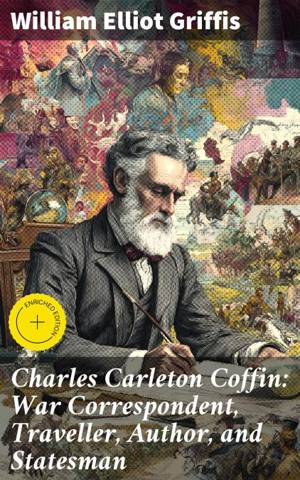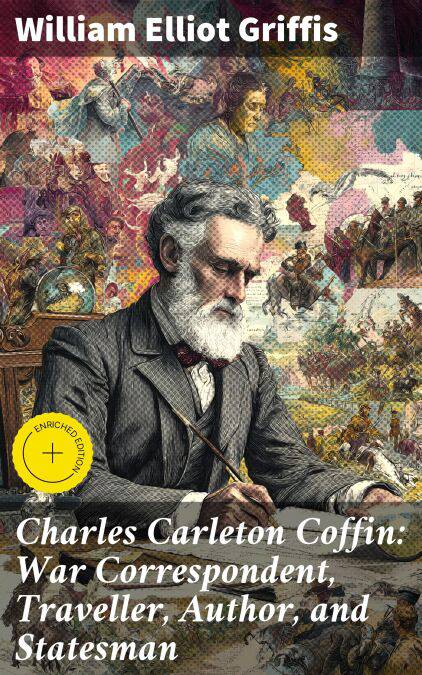
- Afhalen na 1 uur in een winkel met voorraad
- Gratis thuislevering in België vanaf € 30
- Ruim aanbod met 7 miljoen producten
- Afhalen na 1 uur in een winkel met voorraad
- Gratis thuislevering in België vanaf € 30
- Ruim aanbod met 7 miljoen producten
Zoeken
Charles Carleton Coffin: War Correspondent, Traveller, Author, and Statesman E-BOOK
Enriched edition. A Multifaceted American Journey
William Elliot Griffis
E-book | Engels
€ 0,49
Omschrijving
In "Charles Carleton Coffin: War Correspondent, Traveller, Author, and Statesman," William Elliot Griffis offers a compelling biography that intertwines the life of Coffin with the tumultuous events of 19th-century America. Through meticulous research and a narrative rich with historical detail, Griffis constructs a portrait of Coffin as a prolific war correspondent and influential figure whose writings capture the essence of the Civil War era. The book employs a biographical style interspersed with primary accounts, making it not only an informative document but also a literary exploration of the social and political landscapes Coffin navigated throughout his life. Griffis, an eminent historian and author with deep ties to American culture and history, was influenced by his own experiences in journalism and travel. His background as a scholar lends authenticity to his depiction of Coffin's multifaceted contributions to society, including his commitment to civil liberties and his role in shaping public opinion during wartime. Griffis's nuanced understanding of historical context enriches the narrative, elevating it beyond a mere biography to a reflection on the nature of reporting and its impact on democracy. This book is a must-read for anyone interested in American history, journalism, or biographical studies. Griffis's insightful analysis of Coffin's life not only sheds light on the man himself but also invites readers to ponder the broader implications of war correspondents in shaping national narratives. An engaging read that balances biography with broader historical themes, this work is essential for both scholars and general readers alike.
In this enriched edition, we have carefully created added value for your reading experience:
- A succinct Introduction situates the work's timeless appeal and themes.
- The Synopsis outlines the central plot, highlighting key developments without spoiling critical twists.
- A detailed Historical Context immerses you in the era's events and influences that shaped the writing.
- A thorough Analysis dissects symbols, motifs, and character arcs to unearth underlying meanings.
- Reflection questions prompt you to engage personally with the work's messages, connecting them to modern life.
- Hand‐picked Memorable Quotes shine a spotlight on moments of literary brilliance.
- Interactive footnotes clarify unusual references, historical allusions, and archaic phrases for an effortless, more informed read.
In this enriched edition, we have carefully created added value for your reading experience:
- A succinct Introduction situates the work's timeless appeal and themes.
- The Synopsis outlines the central plot, highlighting key developments without spoiling critical twists.
- A detailed Historical Context immerses you in the era's events and influences that shaped the writing.
- A thorough Analysis dissects symbols, motifs, and character arcs to unearth underlying meanings.
- Reflection questions prompt you to engage personally with the work's messages, connecting them to modern life.
- Hand‐picked Memorable Quotes shine a spotlight on moments of literary brilliance.
- Interactive footnotes clarify unusual references, historical allusions, and archaic phrases for an effortless, more informed read.
Specificaties
Betrokkenen
- Auteur(s):
- Uitgeverij:
Inhoud
- Aantal bladzijden:
- 252
- Taal:
- Engels
Eigenschappen
- Productcode (EAN):
- 4064066211462
- Verschijningsdatum:
- 11/12/2019
- Uitvoering:
- E-book
- Beveiligd met:
- Digital watermarking
- Formaat:
- ePub

Alleen bij Standaard Boekhandel
Beoordelingen
We publiceren alleen reviews die voldoen aan de voorwaarden voor reviews. Bekijk onze voorwaarden voor reviews.







